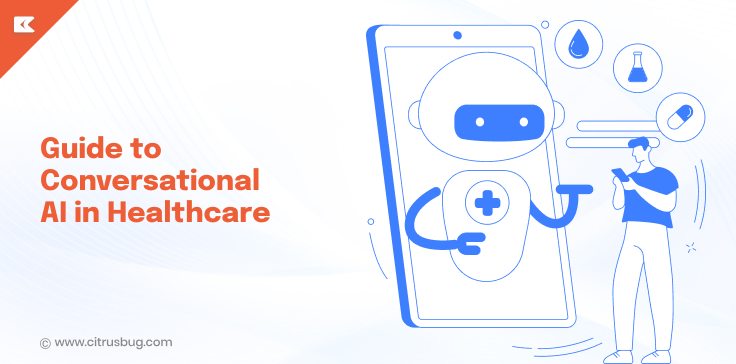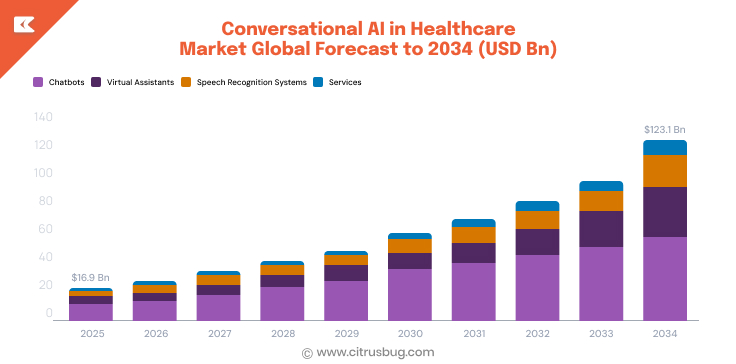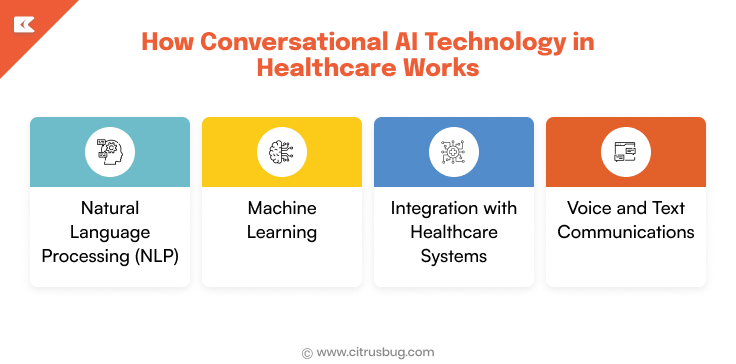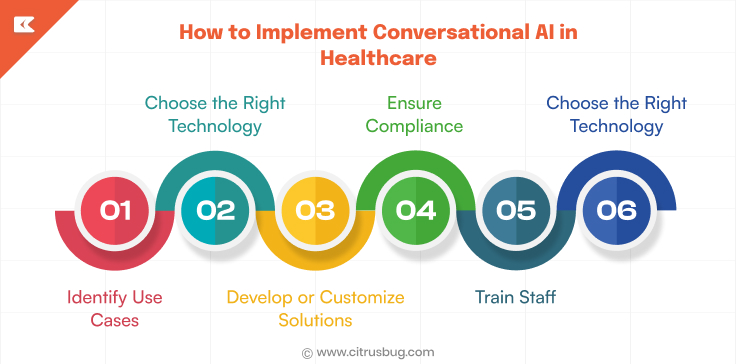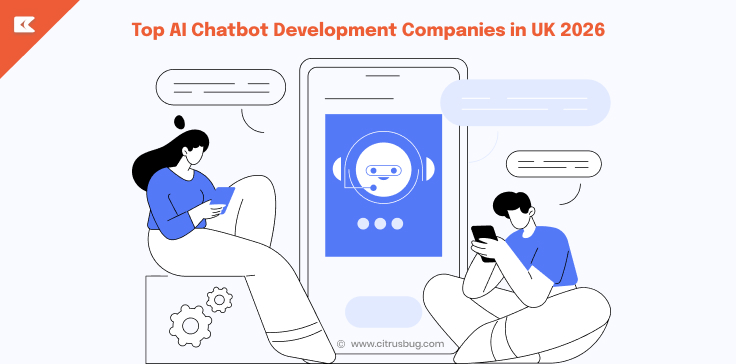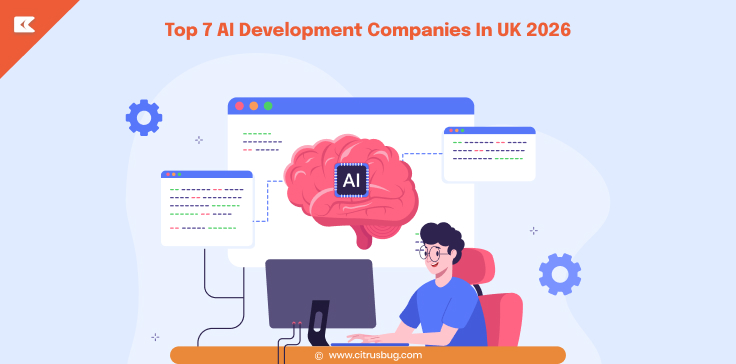Table of Contents
- What is Conversational AI in Healthcare?
- Why Healthcare Needs Conversational AI
- Key Benefits of Conversational AI in Healthcare
- Conversational AI in Healthcare Examples
- How Conversational AI Technology in Healthcare Works
- Compliance and Data Security in Healthcare Conversational AI
- Challenges and Limitations
- Future of Conversational AI in Healthcare
- How to Implement Conversational AI in Healthcare
- Conclusion: Conversational AI for Better Healthcare Outcomes
- FAQs
Healthcare is changing fast, and conversational AI in healthcare is helping lead the way. Intelligent voice- and text-based systems support patients by simplifying the process of booking an appointment, navigating through treatment pathways, and providing timely information. As a result, operational efficiency rises, patient-encounter satisfaction deepens, and the administrative burden on clinical staff is substantially alleviated.
The result is evident. The healthcare conversational AI market is expected to be worth USD 16.9 billion by 2025 and will experience a compound annual growth rate of 24.7%. Recent polls show that 86% of medical institutions already use AI services, and 60% of them argue that the systems make diagnostic and pattern-identification abilities available that surpass human judgments.
These results make it clear that conversational AI has become an essential technological cornerstone of modern and future medical care.
Source: https://dimensionmarketresearch.com/report/conversational-ai-in-healthcare-market/
What is Conversational AI in Healthcare?
Conversational AI in healthcare is a type of AI technology that enables interaction between patients and healthcare workers using human language, whether in the written or spoken form. These systems are not simple chatbots because they understand contexts, pick up on patterns, learn and improve. They are also more personal in their replies. They can respond to patient inquiries, help them go through the symptom check, schedule appointments and even manage medicine adherence.
AI devices can be combined with electronic health records and telemedicine based services to provide on-demand assistance. Custom NLP can also enable conversational AI to identify more complex medical queries with increased precision, which allows it to respond to queries faster, connect with the patient on a deeper level, and ensure important information is conveyed clearly and efficiently.
Why Healthcare Needs Conversational AI
There are multiple challenges in the healthcare industry that can be solved with the help of conversational AI:
1. Staff Shortages
As there is a shortage of healthcare professionals worldwide, AI can be used to ease the work of individuals with simple patient assignments like appointment queries and basic symptom checks. This enables the medical staff to concentrate on complicated cases and critical care. Healthcare conversational AI can also help minimize burnout and improve overall workflow by facilitating the initial communication.
2. Administrative Burdens
Routine administrative tasks such as intake of patients, appointment scheduling, and follow-ups can take a considerable volume of staff time. Conversational AI automates these processes, which helps free administrative and clinical staff. This makes operations easier without losing track of patients’ records and correspondence.
3. Patient Expectations
Patients are increasingly expecting quick 24/7 access to medical services and information. Conversational AI fills these expectations by delivering immediate answers to questions and orienting patients in procedures. The application of AI chatbots in healthcare has the benefit of increasing patient satisfaction, engagement, and patient prescription compliance.
4. Data Management
Healthcare generates vast amounts of data from patient records, lab results, and monitoring devices. This information can be analyzed and organized effectively by IA to derive useful information that aids in clinical decision-making. This not only improves patient care but also allows providers to see healthcare trends and make adjustments to improve healthcare delivery.
Key Benefits of Conversational AI in Healthcare
The use of conversational AI in healthcare can benefit workflows, patient access, and outcomes in a positive way. Below is a clear overview of how it benefits each group:
| Benefit for Providers | Benefit for Patients |
|---|---|
| Reduces administrative workload | Quick 24/7 healthcare access |
| Frees staff for critical care | Personalized guidance and reminders |
| Provides actionable patient insights | Improved treatment adherence |
| Enables efficient patient triage | Faster appointment coordination |
| Supports compliance and accuracy | Accurate and consistent information |
Conversational AI in Healthcare Examples
Conversational AI in healthcare is changing the landscape with methodical applications that enhance the efficiency of patient care and streamline the workflow. The major examples are these:
Patient Onboarding & Triage
AI will be able to take new patients through the registration procedure and inquire about their symptoms and direct them to appropriate treatment promptly.
Appointment Scheduling and Reminders
Patients have access to making appointments and automatic reminders so they don’t miss any visits and ensure their schedules are on point.
Medication Adherence and Chronic Disease Monitoring
The AI can help the patient track their medication and chronic disease to keep care steady.
AI assistants
The AI assistants can give information, answer the questions of patients, and facilitate the telemedicine visits, providing access to healthcare even remotely.
Insurance Questions & Billing Support
Patients can access information concerning their insurance coverage through conversational AI and obtain help in addressing any billing concerns.
Mental Health Chatbots
AI can offer early mental health care support, coping tips, and offer a referral to professional support when needed.
How Conversational AI Technology in Healthcare Works
In the healthcare sector, conversational AI systems operate with the help of multiple underlying technologies.
Natural Language Processing (NLP)
NLP allows the system to comprehend human language, even in medical terms and sophisticated explanations. It allows AI to recognize what the patient is asking and respond with guiding answers.
Machine Learning
The system can learn through its interactions and get better with time. AI can provide more personalized and trustworthy assistance using patterns in patient data.
Integration with Healthcare Systems
AI is integrated with EHRs, telemedicine platforms and other healthcare technologies to be seamlessly connected. This makes the recommendations of the AI compatible with clinical workflows.
Voice and Text Communications
Conversational AI uses voice or text to communicate with patients, which provides flexibility in communication. Such interfaces will enable medical guidance and local guidance to be communicated anywhere at all times.
Compliance and Data Security in Healthcare Conversational AI
To secure patient information and retain confidence, compliance with healthcare regulations is important. Conversational AI should adhere to high standards of safe functioning in the field of healthcare.
HIPAA Compatibility
AI systems should adhere to HIPAA regulations in order to maintain the privacy of patient information. This makes it possible to ensure that sensitive health information is managed in a secure manner.
Data Encryption
All patient information should be encrypted both when stored and transmitted. Encryption prevents unauthorized access and keeps medical data safe.
User Authentication
It provides secure login techniques that establish user identity before their access to the system. This action prevents data leaks and makes it available to the authorized persons only.
Frequent Audits
AI systems should be audited often in order to monitor whether they adhere to the rules and have high protection rates. Audits can be used to identify weaknesses to enhance reliability.
By adhering to these practices, an AI chatbot in healthcare can manage patient interaction safely and efficiently, assisting in providing better care.
Challenges and Limitations
Although healthcare conversational AI is associated with numerous advantages, it also has some obstacles that medical institutions must take into consideration:
- Data Privacy: Sensitive patient data must be contained in a secure manner to ensure that data is safe and regulations are followed.
- Compatibility with the Legacy Systems: Older healthcare systems are not always compatible with new AI tools, which makes integration challenging.
- Precision of Data: AI must be able to provide precise and accurate information because any errors can affect patient care and trust.
- Patient Trust: Not all patients will trust working with AI, especially when there are concerns about privacy standards or accuracy.
- Implementation Costs: Costs of implementing and maintaining the AI system may be expensive and should be well calculated to provide long-term returns.
Future of Conversational AI in Healthcare
The future of healthcare is deeply connected with emerging AI healthcare trends, and conversational AI is the face of this revolution. It is believed that AI systems will be more intelligent, able to interpret detailed medical questions, and give custom instructions to patients.
Improved technology will make it possible to integrate them with medical devices, telemedicine platforms and electronic health records. With the expansion of adoption, providers will increasingly turn to AI software development solutions to develop unique systems that promote efficiency, patient engagement, and clinical decision support.
With these developments, conversational AI will not only automate routine functions but will also become central to preventive care, patient education, and in-real-life monitoring and shape the future of patient-centric healthcare.
How to Implement Conversational AI in Healthcare
When implementing conversational AI in healthcare, it is always important to have a systematic method that benefits both patients and staff.
1. Identify Use Cases
Begin by determining which areas of your healthcare services would benefit most from AI. This could be the triaging of the patients, appointment scheduling, medication reminders, or enhancement of patient engagement.
2. Choose the Right Technology
Selecting the best AI tool in healthcare is dependent on your requirements. Research systems that can interpret natural language are easily integrated into your current healthcare infrastructure and offer top-notch security. Customized and cloud healthcare management solutions give the flexibility that organizations require.
3. Develop or Customize Solutions
One of the most important things is to build AI solutions to fit your workflows. Most companies prefer to hire chatbot developers who can develop tailored systems to suit their patients’ and operational needs.
4. Ensure Compliance
The AI systems should be compliant with data privacy regulations and healthcare regulations, including HIPAA. These rules will keep confidential patient material and gain trust.
5. Train Staff
Ensure your employees know how to implement the AI tools. Proper training makes adoption smooth, and the staff can use AI to help improve patient care.
6. Monitor and Optimize
Keep monitoring the performance of the AI system, gather feedback, and make further improvements. Frequent updates make the interactions truthful, effective, and in tandem with patient requirements.
Conclusion: Conversational AI for Better Healthcare Outcomes
Conversational AI in healthcare is transforming the delivery of patient care, making it easier to manage clinical processes, drive less clerical workload, and make improved clinical decisions. It could be in scheduling appointments or chronic disease management, AI is assisting in delivering faster and customized care to the patients.
At Citrusbug, we provide AI healthcare software development services that integrate seamlessly with your current systems. We have extensive technical expertise to ensure that AI applications are secure, compliant, and unique to the needs of patients and health organizations. When conversational AI is implemented thoughtfully, it can improve outcomes, enhance efficiency and help providers stay ahead in this rapid innovation.
FAQs
What is conversational AI in healthcare?
Healthcare conversational AI is an AI-powered technology solution, like chatbots and virtual assistants, that can read and understand patient questions in natural language. These are helpful when it comes to bookings, symptom checking and advice from reputable healthcare sources.
How is AI used in healthcare communication?
The widespread use of I in the healthcare segment allows enhancing patient engagement and efficiency by improving communication. It allows 24/7 support, reduces administration, aids triage, and allows healthcare teams to communicate information quickly and with more precision.
What type of AI is being used in healthcare?
There are different types of AI in healthcare, each serving unique purposes. These are Natural Language Processing (NLP) to interpret patient conversations, Machine Learning to predict outcomes, and computer vision to analyze medical Imagery. In combination, they facilitate different areas of patient care and work in healthcare.
What is the difference between a chatbot vs conversational AI?
A chatbot is a basic software that responds according to what is pre-programmed. Conversational AI, on the other hand, uses NLP and machine learning to analyze context, learn to respond, and ultimately deliver more natural responses.





 SaaS Development
SaaS Development Web Application Development
Web Application Development Mobile Application Development
Mobile Application Development Custom Software Development
Custom Software Development Cloud Development
Cloud Development DevOps Development
DevOps Development MVP Development
MVP Development Digital Product Development
Digital Product Development Hire Chatbot Developers
Hire Chatbot Developers Hire Python Developers
Hire Python Developers Hire Django Developers
Hire Django Developers Hire ReactJS Developers
Hire ReactJS Developers Hire AngularJS Developers
Hire AngularJS Developers Hire VueJS Developers
Hire VueJS Developers Hire Full Stack Developers
Hire Full Stack Developers Hire Back End Developers
Hire Back End Developers Hire Front End Developers
Hire Front End Developers AI Healthcare Software Development & Consulting
AI Healthcare Software Development & Consulting Healthcare App Development
Healthcare App Development EHR Software Development
EHR Software Development Healthcare AI Chatbot Development
Healthcare AI Chatbot Development Telemedicine App Development Company
Telemedicine App Development Company Medical Billing Software Development
Medical Billing Software Development Fitness App Development
Fitness App Development RPM Software Development
RPM Software Development Medicine Delivery App Development
Medicine Delivery App Development Medical Device Software Development
Medical Device Software Development Patient Engagement Software Solutions
Patient Engagement Software Solutions Mental Health App Development
Mental Health App Development Healthcare IT Consulting
Healthcare IT Consulting Healthcare CRM Software Development
Healthcare CRM Software Development Healthcare IT Managed Services
Healthcare IT Managed Services Healthcare Software Testing services
Healthcare Software Testing services Medical Practice Management Software
Medical Practice Management Software Outsourcing Healthcare IT Services
Outsourcing Healthcare IT Services IoT Solutions for Healthcare
IoT Solutions for Healthcare Medical Image Analysis Software Development Services
Medical Image Analysis Software Development Services Lending Software Development Services
Lending Software Development Services Payment Gateway Software Development
Payment Gateway Software Development Accounting Software Development
Accounting Software Development AI-Driven Banking App Development
AI-Driven Banking App Development Insurance Software Development
Insurance Software Development Finance Software Development
Finance Software Development Loan Management Software Development
Loan Management Software Development Decentralized Finance Development Services
Decentralized Finance Development Services eWallet App Development
eWallet App Development Payment App Development
Payment App Development Money Transfer App Development
Money Transfer App Development Mortgage Software Development
Mortgage Software Development Insurance Fraud Detection Software Development
Insurance Fraud Detection Software Development Wealth Management Software Development
Wealth Management Software Development Cryptocurrency Exchange Platform Development
Cryptocurrency Exchange Platform Development Neobank App Development
Neobank App Development Stock Trading App Development
Stock Trading App Development AML software Development
AML software Development Web3 Wallet Development
Web3 Wallet Development Robo-Advisor App Development
Robo-Advisor App Development Supply Chain Management Software Development
Supply Chain Management Software Development Fleet Management Software Development
Fleet Management Software Development Warehouse Management Software Development
Warehouse Management Software Development LMS Development
LMS Development Education App Development
Education App Development Inventory Management Software Development
Inventory Management Software Development Property Management Software Development
Property Management Software Development Real Estate CRM Software Development
Real Estate CRM Software Development Real Estate Document Management Software
Real Estate Document Management Software Construction App Development
Construction App Development Construction ERP Software Development
Construction ERP Software Development





